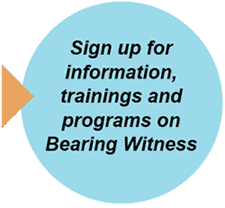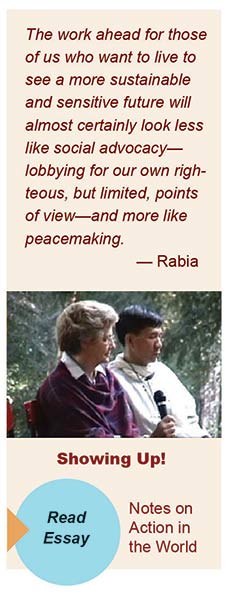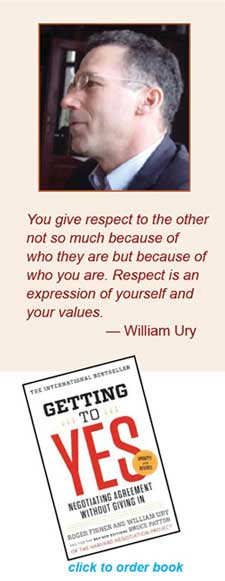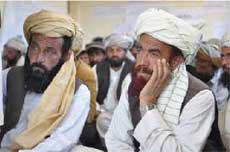
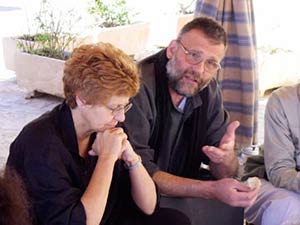 Most of us know that the large organizations and governments that are trying to lead the world are on a self-destructive path, and most of us are paying a price for their decisions. Why, despite so very many hard working and well-intentioned people, have these structures been so difficult to change—especially in the last decades?
Most of us know that the large organizations and governments that are trying to lead the world are on a self-destructive path, and most of us are paying a price for their decisions. Why, despite so very many hard working and well-intentioned people, have these structures been so difficult to change—especially in the last decades?
It seems to me that that two of the obstacles that keep us from moving forward to a more live-giving and sustainable future are:
1) All sides of most disagreements—whether it is climate control, trade agreements, or getting your child to clean his room—tend to use the same tactics for change. We are part of a game of constant opposition.
2) People at work and play spend most of their time talking and planning and making decisions with people who hold the same opinions as they do. This may be a biological hangover from our tribal days, but it is a habit we need to overcome in today’s crowded, diverse and interconnected world.
Our new understanding of how life works offers a radical reconsideration of causality and the dynamics of change. The old scientific mechanistic story visualizes power as one hard cue ball, rolling and hitting and causing another cue ball to move or shatter—unless of course this ball has big defenses around it.
Living systems like families, corporations or countries, however, do not change because they are attacked from without. They change because of a shift, a reordering, of their internal identity.
To change the systems that are destroying the present and the future, we need to be able to discern the relationships, agreements, and values that give rise to the identities that hold their self-destructive behavior in place.
The scientific and spiritual recognition of our collective wholeness—through the total interrelationship, not just of humans, but of all Life—points to the need for a more cooperative approach to change, and a greater understanding of how living systems shift and evolve. We want to welcome the interconnections of our world and get to know better the values and beliefs of those who think differently from us.
Moving through the current period of chaos and deconstruction will require patience and commitment to working together within a more diverse world than humans have ever encountered before. Yet few schools, corporate training programs or leadership workshops teach the skills needed to face the unknown without fear, listen without judgment, and be open to learning from those who disagree with us.
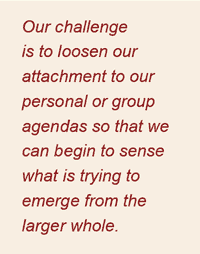 Our challenge is to loosen our attachment to our personal or group agendas so that we can begin to sense what is trying to emerge from the larger whole, which is made up of many agendas at this moment in time.
Our challenge is to loosen our attachment to our personal or group agendas so that we can begin to sense what is trying to emerge from the larger whole, which is made up of many agendas at this moment in time.
This does not mean we excuse greed or need capitulate on what is true—i.e. pretend that a river is not polluted when it clearly is—but we must continue to dialogue. Future leaders will be those who have the collaborative skills and spiritual maturity to bear witness to the totality of what is.
Bearing Witness
Bearing witness is not a mystical or mysterious skill; it is a way of being and of effecting change that is available to all of us as we develop our capacity for intuiting the wider field.
Bearing witness emphasizes skills such as patience, deep listening and honesty in sharing our experiences and feelings. Gradually we learn to stop being so afraid of what is unknown. After all, the unknown surrounds us; to try to control it simply results in anxiety, confusion and unending strife. A more peaceful and stress-free future is possible when we learn to welcome and honor people who look, think and feel very differently from us.
The “Other”
We humans so easily get locked into trying to change or defeat “them” – the “Other.” The Others are those people, and groups, we believe are absolutely wrong and ignorant. We disagree with everything they say and stand for. Nothing can change our minds. They are the reason for our frustration, anger and aggression; they are the cause most of our problems in the world.
But if we reflect on this tendency to polarize and create an “Other” more deeply, we see that we can’t possibly make the community, national, and global changes needed by making half of the population “good” and the other half “bad”—the “Other.” Really, we can’t. There is another way.
The following principles appear quite simple—you may have heard them before from a spiritual teacher, or in your church—but like most important things in life (i.e., marriage, child rearing, committing to a spiritual path), they are not easy. But the ongoing practice of bearing witness will help you to know how you are being asked to make healing change in your world.
- Encounter the other; show up; take the plunge
- Ask caring questions that open the heart of the “other”
- Practice the art of Deep Listening, without judgment
- Understand techniques for setting aside one’s own beliefs and attitudes
- Learn to guide meetings without driving one’s own agenda
- Learn the difference between fixing, helping, and serving
- See ways to bring forth the greater whole that is emerging
- Perceive what is ‘yours’ to do, and when action is ready to emerge
Whether you work in peace building, education, community development, corporate training, or simply want to improve your family dynamics, the process of bearing witness can be helpful. (If you want support in this work, you may find the Women’s Wisdom circles or my mentoring and training sessions helpful.)
I have worked for 30 years in applied systems change, and have spent 26 years working in 17 countries using “Bearing Witness” as a model for transformative action. It has grown out of the teachings and inspiration of many people (Bernie Glassman, Fleet Maul, Dr. King Jr., Witness for Peace, and Elias Amidon, to name a few). It has deep spiritual roots—but is being newly adapted to improve the effectiveness of working with transformative change.
No one person, organization, or political party holds a monopoly on what will make a healthy future for us all—either at the planetary or community level. Perhaps nothing is more important today than crossing the boundaries that seem to separate us and learn to think like an interconnected system.

